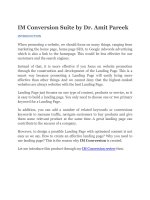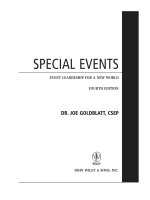Mindfulness book (‘mindfulness medication’ by dr phil
Bạn đang xem bản rút gọn của tài liệu. Xem và tải ngay bản đầy đủ của tài liệu tại đây (2.29 MB, 260 trang )
“Stress, with its challenging and often debilitating effects, is an increasingly
disruptive presence in many people’s lives. This books offers practical
mindfulness tools for pausing and drawing on the inner resources we can
bring to managing our stress in powerful and life af irming ways
Z
VS
PhD, Distinguished Professor of Mood Disorders
University of Toronto, Scarborough
co-author of Mindfulness-Based Cognitive Therapy for Depression:
A New Approach to Preventing Relapse
Phil Blustein, MD
Early Praise for Mindfulness Medication
“Stress, with its challenging and often debilitating effects, is an increasingly
disruptive presence in many people’s lives. This books offers practical
mindfulness tools for pausing and drawing on the inner resources we can
bring to managing our stress in powerful and life af irming ways
Z
VS
, PhD, Distinguished Professor of Mood Disorders,
University of Toronto, Scarborough, and co-author of Mindfulness-Based
Cognitive Therapy for Depression: A New Approach to Preventing Relapse,
Toronto, ON
“Dr. Blustein draws on his years of experience as a physician and
meditation-practitioner to bring us a clear, practical and effective manual
for living healthier and happier lives. As a fellow physician, I would be
happy to pass his prescription on to anyone wanting to prevent illness,
as well as to those in search of healing. In these times of increased stress,
this means all of us
A
R
, MD, PhD, physician, Insight Meditation teacher
and instructor in Mindfulness Based Stress Reduction
Vancouver BC
“Mindfulness Medication is one of the most readable books on Mindfulness
I’ve read. It gets right to the practical heart of Mindfulness, including
tools that move the theory into real life. It builds very solidly, and is very
hands on, giving you what you need to know without being bogged down.
I tend to read a book through before trying exercises, and I found it hard
not to stop and just start putting the exercises into practice
N
B
, Editor, Boon Information Services,
Toronto, ON
Early Praise for Mindfulness Medication
“Dr. Blustein’s work on meditation is quite literally “a breath” of fresh air!
This book synthesizes in a very accessible and modern way, years of study
and personal practice of ancient meditation technique. His experience as
a gastroenterologist has impassioned him to share a very practical model
of meditation for better health and well-being.”
D
F
Former Oil
Gas Executive
Calgary, AB
“Dr. Blustein has done a great job of making basic ideas around mindfulness
accessible and easy to implement for beginners and beyond. His style is
friendly, personal, and easy to read, as he draws from both his personal
mindfulness experience and decades of work with patients suffering
from unexplained physical symptoms. This is a great place to start your
journey into mindfulness and self-discovery!”
L
E C
, PhD, RPsych,
Enbridge Research Chair in Psychosocial Oncology
Alberta Innovates-Health Solutions Health Scholar
Professor Department of Oncology Cumming School of Medicine
Adjunct Professor, Department of Psychology, University of Calgary
Clinical Psychologist Director of Research
Department of Psychosocial Resources, Tom Baker Cancer Centre
Calgary, AB
Mindfulness
Medication
Philip K Blustein
Mindfulness Medication Publishing
All rights reserved No part of this publication may be reproduced or transmitted
in any form or by any means
electronic or mechanical including photocopying
recording or any information storage or retrieval system
writing from the publisher
without permission in
Published by Mindfulness Medication Publishing
E mail mindfulnessmedication gmail com
Website www thebreathproject org
First Paperback Edition January
Library and Archives Canada Cataloguing in Publication
Blustein Phil
author
Mindfulness medication A physician s prescription for stress relief
Phil Blustein MD
Includes bibliographical references
Issued in print and electronic formats
ISBN
pbk
ISBN
Stress management
RA
B
ISBN
html
Stress Psychology I Title
C
C
TECHNICAL CREDITS
Editing Crescent McKeag Calgary Writing Services Calgary Alberta
Front Cover Photograph and Author Portrait Peter Beech Photographer Calgary
Alberta
www airshots ca
Illustrations Scott Lewis Vancouver British Columbia
com
Design
www storyboardlabel
Production Jeremy Drought Last Impression Publishing Service Calgary
Alberta
Printed in Canada by Blitzprint Inc. Calgary Alberta Canada
Mindfulness
Medication
A Physician’s Prescription
For Stress Relief
Phil Blustein, MD
Mindfulness Medication Publishing
C
A
for Shira and Jared
who ill my heart with love and joy
and have taught me that wisdom is present at any age
Contents
Acknowledgements .............................................................................................. ix
Introduction ...............................................................................................................
What Your Body Has in Mind When You Don t Mind Your Body .......
Meet Your Mind .......................................................................................................
The Origin of Thoughts ......................................................................................
The Emotional Consequences of Thought .................................................
The Physical Consequences of Thought......................................................
Mindfulness A Technique to Deal with Stress ........................................
Mindfulness and the Breath.............................................................................
Mindfulness and the Body ...............................................................................
Mindfulness of the Process of Thought Development ........................
Mindfulness Integrative Practice................................................................
Meditation Sitting in Stillness .....................................................................
Mindfulness in Action Being Present in the Moment........................
The Mindful Mind ...............................................................................................
Other Techniques for Stress Management ..............................................
Where Does the I Come From .................................................................
Inner Child..............................................................................................................
Dialogue A Friendly Chat with Your Inner Child .................................
Empathy for the Inner Child ..........................................................................
Empathy for Others............................................................................................
Mindfulness of the Inner Child Putting it All Together ....................
Some Final Thoughts ........................................................................................
Suggestions for Further Reading ................................................................
Index ........................................................................................................................
About the Author ................................................................................................
Acknowledgements
that have in luenced my path I would
like to extend my appreciation for these wonderful teachers, who
have in luenced humanity with great knowledge insight and
compassion.
They include the Buddha and many teachers of Spirit Rock and the
Insight Meditation Society Marshall Rosenberg with his wonderful
work on nonviolent communication Margaret Paul Erika Chopich
Hal and Sidra Stone and John Pollard for their insight on the inner
child.
I have been blessed by the following people, each of whom has
offered helpful support Crescent McKeag for her great editing Scott
Lewis for his playful and creative illustrations Shelley Cooper for her
wonderful computer skills and Jeremy Drought of Last Impression
Publishing Service for his expert book design.
I would like to further dedicate this book to my family, friends,
patients and readers and inally to my own mind which creates so
many opportunities for me to learn on a continual basis.
I
ix
Introduction
D
that you were born into this
world and someone forgot to give you the driver’s manual for
your own mind One day you re sitting in a fancy new luxury
model, the next, you’re driving around in a clunker. Some days your
mind seems to run on and on but you can t seem to ind the brake
You may ind yourself heading from one disaster to another and the
steering wheel won t respond You may want to direct your mind in a
way that’s more peaceful and forgiving but it’s as if you’re sitting in a
car that you have no control over. Suddenly, you’re just a passenger in
your own mind, not the driver.
So how do you ind the driver s manual for your mind so that you re
not just a passenger on a wild ride There is no one right answer
however, there is hope. With some reading and diligent practice,
think of it as driver training, you will begin to really get a handle on
how your mind works.
I have been a doctor now for over thirty years. I work in a hospital
where I specialize in things that go wrong with the digestive system.
During my time as a medical specialist, I began to notice more and
more, how much of a tremendous role stress seemed to play in my
patients’ medical problems. Patients would come to the hospital with
symptoms of chest pain, heartburn, abdominal pain, diarrhea or
constipation. When I asked what had been going on just before the
onset of their symptoms, they often told me that they had been feeling
very stressed about family work or inancial issues They hadn t even
considered that there might be a relationship between their physical
symptoms and all the stress in their
lives. If you can effectively deal
with your own stress, there is the
real possibility that you will have
fewer medical issues in your life!
1
2
Mindfulness Medication
I myself, like everyone else, have struggled with stress and a mind
that wasn’t always so kind to me. I could be happy one moment, sad
the next. I felt, at times, that I had no control over what would pop
into my head. I would react automatically to whatever was occurring
in my life. I just wanted more calmness and joy, but I was at the mercy
of my mind It became my primary mission to ind the best way to
deal with this.
I became a doctor, read a lot, went to therapy and studied Eastern
and Western approaches to stress reduction and the workings of the
human mind. It’s taken me a long time, but I can honestly say that
slowly, I have started to be present in life from a place of greater joy.
I’m not so much the victim of my thoughts anymore. I have a greater
sense of clarity and understanding about what is happening in my
thoughts from moment to moment and this process is constantly
evolving.
You and I both have to deal with some stress every single day It s
a part of life! However, it’s for exactly this reason, the fact that you
face stress everyday and somehow keep soldiering on, that you may
not realize when your stress is building up and causing you actual
physical harm. Of course there’s no magic pill or day surgery that
will cure a high-pressure job, too little time, too many demands, a
bad relationship or the daily juggling act of kids and career You can
always wait until something serious goes wrong and then a specialist
like me might be able to patch you up and send you back out there, but
I have a wonderful alternative.
I present to you an integrated, novel approach encompassing the
best techniques for reducing the stress in your life that I could ind
from my experience with both Eastern and Western practices. In
essence, this approach employs mindfulness to hold your physical
and mental stress and inner-child dialogue to change the paradigm
of your thinking which is leading to a painful existence. I recommend
this approach to you now as a pre-scription, a life-insurance policy
that will go a long way toward keeping you healthy and well and out
of my of ice While it s unrealistic to think that you ll ever be free of
stress completely, a sense of freedom and happiness comes from the
ability to be fully present during these stressful experiences, without
Introduction
3
amplifying their trauma or identifying with them. When it comes to
stressful events, it doesn’t matter what they are, it matters how you
are with them.
This book is meant to be used; to be revisited again and again. It
really is all about you! What you put into it, in terms of attempting
what I suggest by processing and practicing, will be what you get out
of it. Do what works for you and take from it what you can. Every
little bit of practice will help Return to reading the rest of the book
in sequence, whenever you’re able to, as each section builds on the
one before. In understanding lies real stress relief.
This book serves as a practical sequential guide that will bring
you to an understanding of how your mind works the way it does and
why it does so. There are effective techniques outlined here that will
help you to deal with your stress right at the very moment it occurs.
There are also approaches that will help you to change the underlying
mechanisms at the root of your unhappiness. Some parts of this book
will appeal to you, while others may not seem to apply.
I’m looking forward to sharing with you what I have found to be
personally helpful for both my patients and myself. Hopefully, this
will provide you with your own insight into how to live in this world
with greater peace and satisfaction. I offer this book to you as a
re lection of my belief in service I believe that all of us are connected
through our shared humanity and our universal mental suffering.
Stress affects every human being on the road of life, but you’re in the
driver’s seat now. Here’s the manual you were looking for.
Dr. Phil Blustein
Calgary, Alberta
December
1
What Your Body Has in Mind
When You Don’t Mind Your Body
S
of illness but it can certainly make
what you do have worse. People get sick for multiple reasons,
which include genetics, lifestyle issues and environmental
toxins. Stress is something that all people experience and it can lead
to physical problems as well Stress re lects how you perceive and
interpret the events in your life. Western medicine is fantastic at
identifying and treating physical ailments, but it doesn’t emphasize
and prioritize the contribution of underlying stress to these medical
issues. Most people deal with the consequence, and not the cause, of
an illness.
I’d like to introduce you to some of my actual patients so you can
start to connect the dots for yourself:
Larry is a big man He has a big appetite a big family and when he
has diarrhea it’s a big problem. He has a long-standing history of
Crohn s disease an in lammatory condition of the bowel and had
already undergone surgery. He was doing quite well, until several
months ago. When I inquired, he told me about having to care for his
father who had recently died, and that he was
laid off from a job that he had been working
at for the last ten years. The economy
forced him to take a new job that he really
hated, for less pay. He and his wife were
constantly battling over inances His
diarrhea and abdominal pain had become
progressively worse and worse until he
ended up with a bowel obstruction that could
only be corrected by yet another surgery. He
had ignored a growing problem for a long time
5
6
Mindfulness Medication
but his body hadn t I was frustrated that I could only try to ix the
damage done after the fact instead of helping Larry learn how to
interfere with the progression of his disease while he still had a
chance to avoid the knife.
Mika is another of my patients but she is representative of so many.
She had recently come from Thailand to work in Canada It was a new
job, a new language and a new culture. She had left her family back
home and they were depending on her to send back money to support
them Clearly under tremendous pressure she began to experience
problems with abdominal pain and an irregular bowel pattern with
alternating diarrhea and constipation, gas and bloating. She also
began having dif iculty sleeping and was experiencing headaches
and fatigue which are often some of the irst symptoms of ongoing
stress. All of her medical tests came back normal and I diagnosed her
with Irritable Bowel Syndrome. Again, Mika’s body was reacting to
the levels of stress in her life and I was forced to just help her treat
her symptoms, knowing that until she lowered her stress levels, she
was in for more suffering, pain and grief.
What’s common to both of these patients and many others, is that
their symptoms are really secondary to, or aggravated by, the stress
in their lives. Their symptoms are what western medicine calls ‘stress
induced’. If they had been able to understand what their stress levels
were doing to their bodies before it made them sick and if they also
had some help to then reduce their stress, perhaps I may never have
met them at all!
Let s start by taking a look at what both Eastern and Western
philosophies have to say about how you create and deal with stress.
Both schools of thought offer tremendous insights Rather than seeing
them as separate, I have tried to integrate the tools and concepts
that I have found to be most useful, regardless of point of origin.
This integrative approach merges the best of Eastern and Western
philosophy, medicine, and psychology as a means to understand the
mind, how each of us creates stress, and how you can best learn to
manage and minimize it.
What Your Body Has in Mind
7
Autonomic Physical and Psychological Responses
Have you ever had to consciously tell your heart to beat, or your lungs
to breathe in order to make sure that they were doing their jobs
Your heartbeat and breathing are both examples of what scientists
call autonomic involuntary behaviours. That’s a fancy way of saying
that these biological activities carry on independently, without you
having to be actively aware of what’s going on. The same can be
said for a lot of the mental activities that carry on in your life. As an
example, see if any of the following scenarios are familiar to you:
Have you ever had an experience where you drove from one
spot to another and have suddenly realized that you don’t
recall driving the last few blocks, or even the whole trip
sometimes
Have you ever mindlessly eaten something without really
tasting any of it because you were thinking about something
else
Have you ever reacted to a situation with such intensity and
anger that your response was way over the top and then you
wondered later Where did all that come from
Do you have an inner voice that s constantly critical and
which seems to always have something negative to say, as it
evaluates your actions and appearance and how you compare
to others
Your mind is constantly thinking evaluating and judging as well
as going over what happened in the past and your plans for the future.
This is in fact the normal function of the mind Just as your heart
beats and your lungs breathe, your mind thinks. It’s what it does
naturally, but unlike the moment-to-moment activities of the heart,
or the lungs, the automatic thoughts that go through your head are
something that can be observed, examined, changed and released.
Your thoughts are the product of your experiences your history your
biology and most importantly, your habits. External events conspire
with the internal workings of your mind to create stress.
8
Mindfulness Medication
But you’re not simply a robot that follows the automatic directions
of your mind You can actually think about your thoughts You can
examine what’s going on in your mind and what your mind says to
you. Because your mind has the ability to literally think about itself,
you can often ind ways in which your habitual patterns of thought
are maintaining a stress response.
The physical stress response that occurs when your mind
perceives a threat is a powerful one When Larry irst lost his job
he thought constantly about how catastrophic this turn of events
was He felt that it was a threat to his inancial and social status and
potentially a threat to not only his own survival, but also the survival
of his family. His body in turn helped him out by releasing adrenaline
and cortisol, the body’s alarm bells, as well as other chemicals. These
chemicals prepared him to ight or run as if the origin of the threat
were a predatory animal out for his blood. Physically, his heartbeat
and breathing rate increased. His blood pressure rose and his mouth
went dry. The pupils of his eyes grew bigger and his muscles received
more blood in preparation for an immediate action like running or
punching, but there was no one to run from and certainly no one to
punch!
As he continued worrying about his situation, his body could
not sustain the initial stress response. It tried to adapt but couldn’t
keep it up. He wasn’t sleeping well. His immune system also stopped
working very well so he got every cold and lu bug going around He
was tired all the time, because it’s hard work for the body to stay
ready to ight or run around the clock His digestive system was a
mess Needless to say that even when Larry got a new job he was
still worried about making ends meet and his body continued to ‘help
him’ by keeping up all the stress responses as best it could, until one
by one, his body’s systems and processes began to break down.
Larry of course wasn t aware of what his body was up to in
response to his constant worrying. He only knew that he didn’t feel
the best and it was getting worse not better. The body really tries
not to bother you with trivial things like the fact that your heart is
beating, your food is being digested and your lungs are supplying
oxygen one breath at a time, until and unless it really can’t cope
What Your Body Has in Mind
9
anymore. That’s when you’d come to me, but by then it’s often too
little too late. By learning to recognize the early symptoms of too
much stress and what both your body and your mind are trying to
tell you, you can intervene earlier in the process.
I think that you can probably relate to the fact that your life is
hectic and often you feel a sense of stress about the events that you
encounter You know that there s a problem and it would be great
if you could have some tools to help you deal with your issues. The
next chapters outline how your mind works to create an intimate
connection between your thoughts and your emotional and physical
responses, but let’s cut right to some solutions.
Eastern philosophies offer some powerful antidotes to the stress
response that are being incorporated more and more into the frontiers
of Western medical practices. The Eastern concept of mindfulness
allows you to create some much needed space in the mind as it were;
so that you can then use the Western based techniques of inquiry and
inner-child dialogue to understand the origins of your belief system.
Your stress response really depends on how you react to your own
thoughts. Mindfulness is simply the process of trying to be aware, in
an accepting and non judgmental way, of what you’re thinking about,
what you’re feeling, and what your body is up to. Inquiry and innerchild sialogue are based on investigations into how belief systems and
patterns of behaviour develop and persist from childhood to affect
your adult responses.
The technique of mindfulness allows you to be present and aware
of what’s on your mind, without identifying quite as strongly with
the stories that you habitually tell yourself and without needing to
change anything about the experience you’re actually having. It’s a
way of practicing how to not get so carried away. It’s this bringing
together of Western insight into the nature and origin of thought, and
the Eastern tradition and practice of mindfulness that can provide the
tools to live, not free of thought, but with the freedom to have your
thoughts along with an extra-helping of peace of mind. When you get
better at minding your mind, your body won’t have a mind of its own!
10
Mindfulness Medication
Practice
Think of times in the past when you felt sick that you now
know were related to stress.
How do you personally experience stress in your thoughts
feelings and body
Summary
Stress can make you sick or make what physical problems you
do have much worse.
Your thoughts are what trigger the body s stress response
Once the body s stress response is triggered it continues to
affect you without you necessarily being aware of it until it
can no longer cope and its resources are exhausted.
The technique of combining Eastern mindfulness practices
with Western investigation into belief systems and the nature
and origin of your thoughts can provide excellent stress relief.
2
Meet Your Mind
I
introduced to the fact that once
your mind starts thinking that there’s a threat, something going
wrong in your internal or external environment, it starts a physical
process in your body whose initial purpose is to help you to better
deal with that threat. If you don’t think that the threat is gone, then
your body begins to not work as well, bit-by-bit, until eventually you’ll
need a doctor. However, the initial perception of a threat occurs in
your mind as a thought. What one person thinks is very threatening
and stressful someone else may not.
Mika, my patient from Thailand, for example, grew up with very
deadly snakes in her home country and has been afraid of them since
childhood Larry has a pet snake and it sits wrapped around his
shoulders and watches TV with him What Mika thinks of as stressful
in this case the sight of a snake Larry thinks of as fun or interesting
Their thoughts about the same snake are very different.
So if stress is dependent on your thoughts about something, let’s
take a look at thoughts, what they are and where they come from.
Some insights into how your mind works can help you better manage
the stress in your life.
I’m going to lead you through some exercises that will open the
door to understanding your own thought processes. This is a step-bystep journey of personal discovery that will give you an understanding
of your own mind, the driver of your actions.
How many thoughts do you have?
The average person has about
thoughts a day Further
of these thoughts are the same repetitive notions playing over and
over You re constantly thinking but most people are not consciously
11
12
Mindfulness Medication
aware of the type of thought passing through, how often it comes
around or what triggers that particular thought Your mind is like
a popcorn machine, constantly popping up thoughts, but you’re only
consciously aware of a small percentage of them.
Let s try something See if you can count every thought that comes
into your consciousness. Even if the thoughts seem to be something
along the lines of the following:
This is stupid
I wonder how long it s been
I need to do laundry and get to the store
Is that one thought or two
Just try to count them as best you can
H
Set a timer for two minutes. There are countdown timers
available online, as various apps, or you can set an egg timer,
watch or cell phone timer Close your eyes Count your
thoughts and return to reading the book after you’re through.
How many thoughts did you have Were you surprised by how
many you had They certainly aren t permanent If you wait long
enough a new thought will always come up. Imagine how many
thoughts you’re not even aware of.
As you begin to observe your mind, you’ll notice that it’s always
active and that it tends to say the same things over and over again.
Let s admit it most of the time we all
have pretty boring minds.
You probably get so caught
up in your thoughts, just by
force of habit, that even when
you’re sitting silently you’re
not really at rest. If you mention
to someone that you’re going to
go away on a silent retreat, often
his or her initial reaction is, “I
Meet Your MInd
13
couldn t do that I could never sit still My mind is always thinking Of
course it is! Thinking is what the mind does. It’s the natural function
of the mind, but you’re not necessarily at its mercy.
What’s the nature of your thoughts?
Once you start looking in on your thoughts you’ll probably notice
that most of them seem to be about reliving the past, or planning
for imagining the future Few of them tend to be about the present
moment.
Let s jump right into another exercise When a thought pops up I
want you to name the time period when it seems to be occurring You
can say past, present, or future.
H
Set your timer for two minutes again Close your eyes and note
when in time your thoughts are occurring Return to the book
when you’re done.
Were your thoughts predominantly about events that happened in
the past Were your thoughts predominantly about events that may
occur in the future Or were they focused on the present moment as
it unfolded
The future hasn’t happened and therefore doesn’t exist as yet and
the past has already gone by and therefore also doesn’t exist in the
here and now. The present, this very moment, is the only time that
you have any real control over. If your thoughts tend, as most do, to
the future or the past, you’re missing out on a lot of the right now.
You re generally not fully present to the beauty of the only moment in
time that truly exists!
Another aspect of thought is that it’s largely concerned with
judging comparing and criticizing Your mind is constantly evaluating
every external and internal situation that you encounter.
Here’s another exercise to help you understand your own thoughts.
This time you’re going to pick a word that basically describes what
the thought is about as it happens. Say something to yourself like









